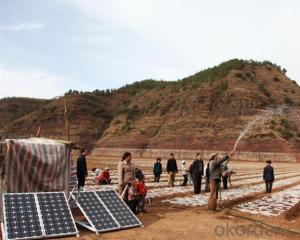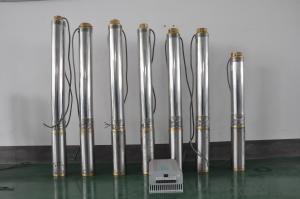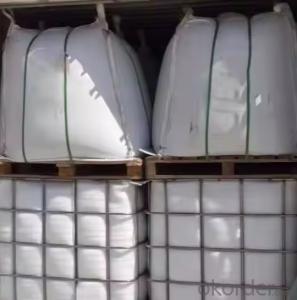Solar Water Pump Centrifugal Pump System 0.8-1KW for Agricultural Irrigation
- Loading Port:
- Shanghai
- Payment Terms:
- TT OR LC
- Min Order Qty:
- 10 pc
- Supply Capability:
- 1000 pc/month
OKorder Service Pledge
OKorder Financial Service
You Might Also Like
Solar Water Pump Centrifugal Pump System 0.65KW for Agricultural Irrigation
The photovoltaic pumping system is different from the traditional AC pumping system , and the photovoltaic pumping system utilizes solar cells convert solar energy into electric energy , then the photovoltaic pumping inverter drives ac motor for the pump running , and pumping up water from water well , river , lake etc areas and then transport to the destination to satisfy our requests for the water demand .
Photovoltaic arrays adopts solar radiation energy to convert it to electric power ,providing the motive power for the whole system . And the function of the solar pumping inverter is converting the DC power output from PV array to AC power to drive the pump to finalize the water pumping up as well as adjusting the output power real-timely according to the change of sunlight intensity , in this way , the system realizes the max power point tracking and the solar energy can be utilized furthest
The whole system solves the water pumping up requests perfectly , omitting the battery bank and charge controller etc equipments , so it is very economical and environmental . Since they are with the merits of low carbon , energy conversation , environmental protection etc , so they have a broad market foreground and great social value
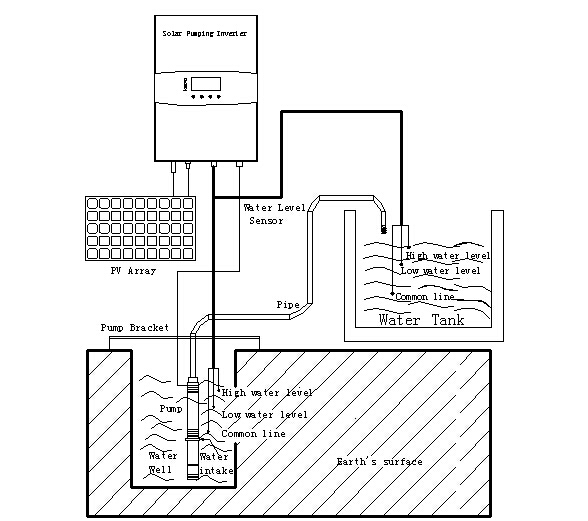
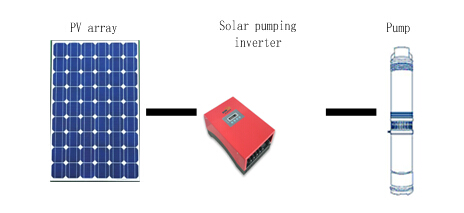
2.2 Application
Agricultural irrigation
Desert manage
Domestic water
Grassland animal husbandry
city waterscape
Island water supply
Landscape and fountain system of municipal engineering , city square , hotels and residence community
2.3 About product
This product is using a high performance digital signal processing chip, can provide solution for solar water pumpingsystem with high cost performance. Solar pumping system as a whole block diagram as shown in 2.
SHP series inverter has the following features:
a. True max power tracking technology (TMPPT) with our own intellectual property; effectively improve the use ratio of PV array. The stable tracking efficiency can reach 99.2% , Solving the problem of bad tracking efficiency and running unstability under the situation of sunlight intensity quick change when comparing with the traditional MPPT method .
b. Adopt efficient IPM power module from Mitsubishi Company with high reliability.
c. With the function of high and low water level detection , high safety factor.
d. Automatic anti-drying protection function , with multi-protection for motor
e. Multi-language LCD display , easy for operation , very user-friendly
f. The independent developed principal computer with our own intellectual properties , remote monitoring is available
g. Modular design , direct plug-in terminal , good-looking appearance, easy for installation , operation and maintenance .
h. Suitable for the pump adopted three phase asynchronous motor
i. Complete digital control , with the function of full automatic running and data storage .
j. Perfect protection system , with the protection function for lighting , over voltage , under voltage , short circuit , over loads , water drain off , low sunlight , over heating etc ,
k. Adopt the complete radiating system , so radiating efficiency is better and the service life is longer
l. Through strict environmental test , adapt the rigorous environment :-10℃~+50℃
m.No impacted mains supply power switch function (optional ), All-weather running available
n. Through strict environmental test , adapt the rigorous environment :-10℃~+50℃
FAQ
1. How fast will my system respond to a power outage?
Our solar inverters typically transfer to battery power in less than 16 milliseconds (less than 1/50th of a second).
2. What kind of batteries do the systems include?
Our solar backup electric systems use special high-quality electric storage batteries.
3. How do I install my system?
A solar backup inverter is connected to a home electric system , we will supply detailed installation manual and videos for our customers .
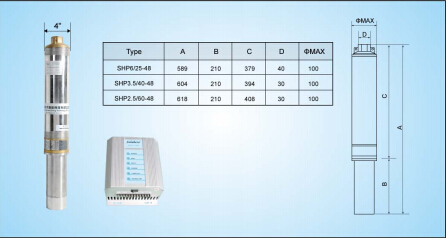
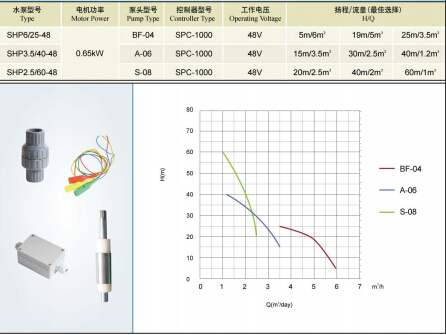
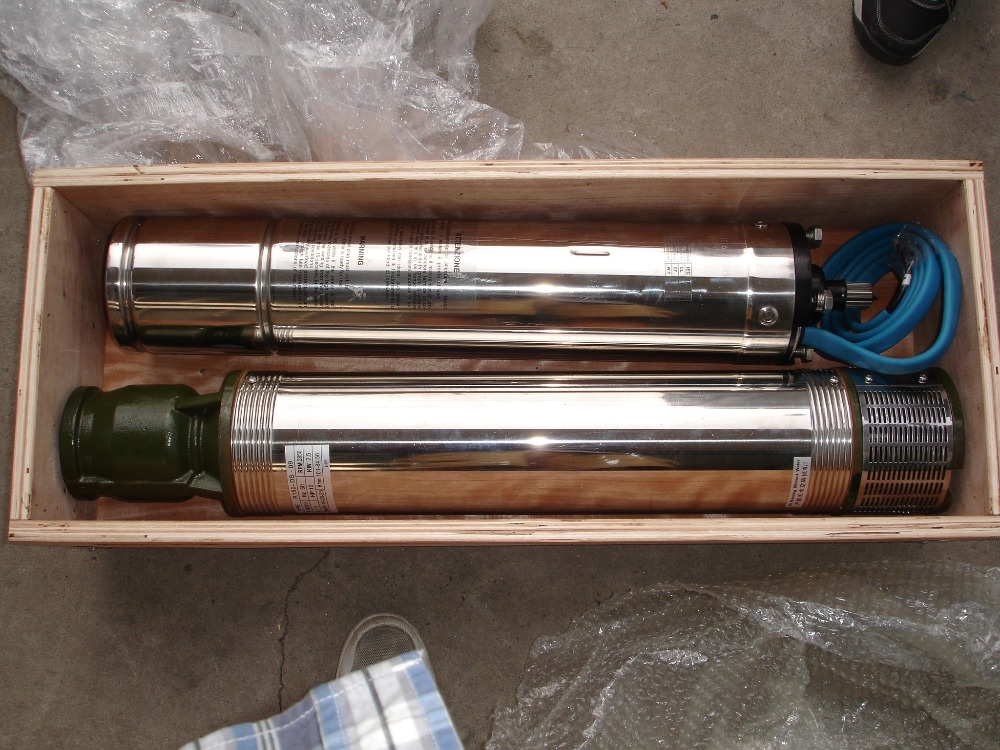
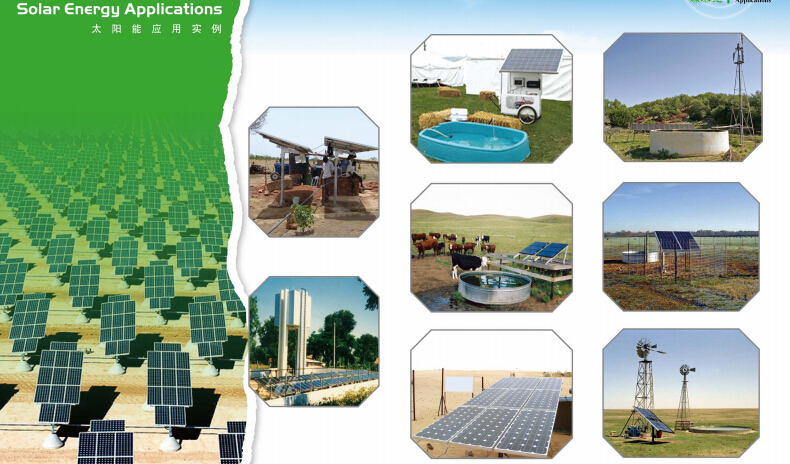
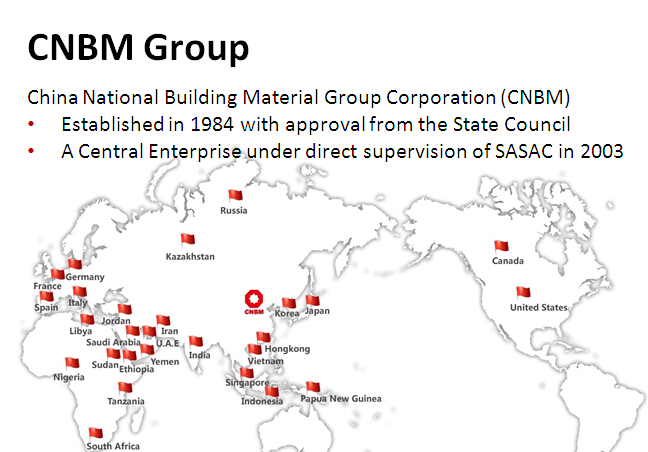



- Q:What is the pump for solar hot water
- Traditional solar water heaters are falling into the water. The water pressure depends on the distance from the roof to the room, the greater the distance, the greater the water pressure. If the water pressure requirements, there are two ways
- Q:Can a solar pump be used for agricultural applications?
- Solar pumps are a viable option for agricultural purposes. They serve as an excellent alternative to traditional pumps that rely on fossil fuel-powered engines or electricity from the grid. Specifically, they are highly suitable for agricultural use in areas with ample sunlight and limited access to electricity. Various agricultural applications can benefit from solar pumps, including irrigation, livestock watering, and crop spraying water supply. These pumps offer remarkable efficiency, cost-effectiveness, and environmental friendliness. By harnessing solar energy, they eliminate the need for expensive fuel or electricity, consequently reducing operational costs for farmers. Moreover, solar pumps provide a consistent and dependable water supply, ensuring adequate irrigation for crops even in remote or off-grid locations. Their installation is simple, maintenance requirements are minimal, and their lifespan is long, making them a practical solution for agricultural needs. In addition to these advantages, solar pumps contribute to sustainable farming practices by diminishing carbon emissions and reducing reliance on non-renewable energy sources. Farmers can also benefit from government incentives and subsidies that are often available for adopting solar-powered equipment. To summarize, a solar pump is an exceptional choice for agricultural applications due to its efficiency, cost-effectiveness, reliability, and environmental benefits. It encourages sustainable farming practices and offers a feasible solution for farmers facing limited access to electricity or high fuel costs.
- Q:Are there any limitations to the temperature range a solar pump can operate in?
- A solar pump's ability to operate is limited by temperature. It is designed to work best within a specific temperature range, typically from -20 degrees Celsius to 50 degrees Celsius (-4 degrees Fahrenheit to 122 degrees Fahrenheit). If the temperature goes beyond these limits, the solar pump's performance and efficiency may be greatly reduced. In freezing temperatures, the pump's components, such as the motor and pipes, may freeze, leading to damage or malfunction. To prevent freezing, additional insulation or heating elements may be necessary. However, this can make the system more complex and expensive. On the other hand, excessive heat can also be problematic for solar pumps. The motor can overheat, which reduces its efficiency and lifespan. In some cases, the pump may automatically shut down to prevent damage. Proper ventilation and cooling mechanisms are necessary to ensure the pump stays within acceptable temperature ranges. When installing a solar pump system, it is crucial to consider the local climate and environmental conditions. Extreme temperatures, whether too hot or cold, can affect the pump's performance and how long it will last. Consulting with a professional and choosing a solar pump model suitable for the specific temperature range is essential to ensure reliable and efficient operation.
- Q:Can solar pumps be used for water supply in remote hospitality or tourism facilities?
- Yes, solar pumps can be used for water supply in remote hospitality or tourism facilities. Solar pumps are an eco-friendly and cost-effective alternative to traditional pumps that rely on electricity or fuel. They can provide a reliable and sustainable water supply even in remote areas where access to conventional power sources is limited. Additionally, solar pumps require minimal maintenance and can operate efficiently in off-grid locations, making them a suitable choice for remote hospitality or tourism facilities.
- Q:How does a solar pump handle water with high iron content?
- A solar pump can handle water with high iron content by utilizing filtration systems and iron removal techniques. These pumps typically include pre-filters and sediment traps to remove large particles and sediments, and some models also incorporate iron removal systems like water softeners or oxidation filters. These mechanisms help prevent clogging, corrosion, and damage to the pump components, ensuring efficient water flow and operation even with water containing high iron content.
- Q:Can a solar pump be used for pool heating?
- Certainly, pool heating can be achieved through the utilization of a solar pump. These pumps are meticulously designed to facilitate water circulation through the utilization of solar energy, rendering them a highly economical and environmentally friendly alternative for pool heating purposes. The fundamental functionality of a solar pump involves the capture of solar heat and its subsequent transfer to the pool water as it circulates through the pump. This intricate process effectively heightens the water temperature, thus ensuring a pleasant swimming experience even in the colder months. Moreover, solar pumps necessitate minimal maintenance and boast an extended lifespan, thereby making them an exceedingly popular choice among pool owners seeking to curtail energy consumption and reduce heating expenses.
- Q:How does a solar pump handle water quality issues?
- A solar pump can handle water quality issues by using a combination of filtration and disinfection methods. It can include sediment filters, activated carbon filters, and UV or chlorine disinfection systems to remove contaminants such as bacteria, viruses, chemicals, and sediments from the water. This ensures that the pumped water is safe and suitable for various applications, including drinking, irrigation, and livestock watering.
- Q:Can a solar pump be used for waterfalls or decorative fountains?
- Waterfalls or decorative fountains can indeed utilize a solar pump. These pumps are specifically engineered to harness the power generated by solar panels, making them an environmentally sustainable option for powering water features. Equipped with a photovoltaic panel, these pumps can convert sunlight into electricity, allowing them to function independently without relying on the grid for power. Available in various sizes and capacities, solar pumps can cater to different water feature designs, including waterfalls and decorative fountains. They possess the capability to deliver the necessary water flow and pressure, creating visually stunning effects and soothing sounds in your outdoor area. Furthermore, the installation and maintenance of solar pumps are effortless, as they do not require any electrical wiring or connections.
- Q:Can a solar pump be used for water supply in schools or community centers?
- Yes, a solar pump can be effectively used for water supply in schools or community centers. Solar pumps are ideal for remote or off-grid locations where access to electricity is limited. They use solar energy to power the pump, which means they are cost-effective and environmentally friendly. Solar pumps can provide a reliable and sustainable water supply, making them an excellent choice for schools or community centers.
- Q:How much power does a solar pump require?
- The power requirement of a solar pump depends on various factors such as the desired water flow rate, head pressure, and efficiency of the pump. Generally, the power range for solar pumps can vary from a few hundred watts to several kilowatts.
1. Manufacturer Overview |
|
|---|---|
| Location | |
| Year Established | |
| Annual Output Value | |
| Main Markets | |
| Company Certifications | |
2. Manufacturer Certificates |
|
|---|---|
| a) Certification Name | |
| Range | |
| Reference | |
| Validity Period | |
3. Manufacturer Capability |
|
|---|---|
| a)Trade Capacity | |
| Nearest Port | |
| Export Percentage | |
| No.of Employees in Trade Department | |
| Language Spoken: | |
| b)Factory Information | |
| Factory Size: | |
| No. of Production Lines | |
| Contract Manufacturing | |
| Product Price Range | |
Send your message to us
Solar Water Pump Centrifugal Pump System 0.8-1KW for Agricultural Irrigation
- Loading Port:
- Shanghai
- Payment Terms:
- TT OR LC
- Min Order Qty:
- 10 pc
- Supply Capability:
- 1000 pc/month
OKorder Service Pledge
OKorder Financial Service
Similar products
New products
Hot products
Hot Searches
Related keywords
